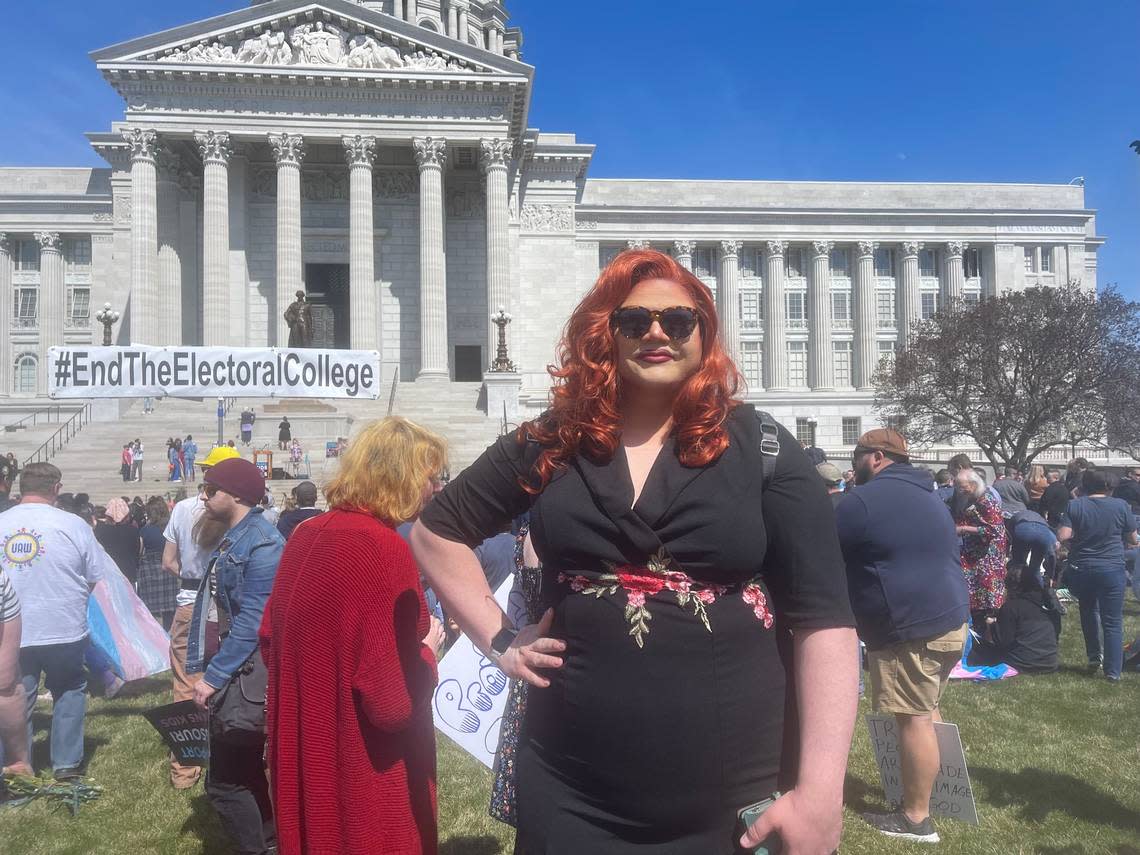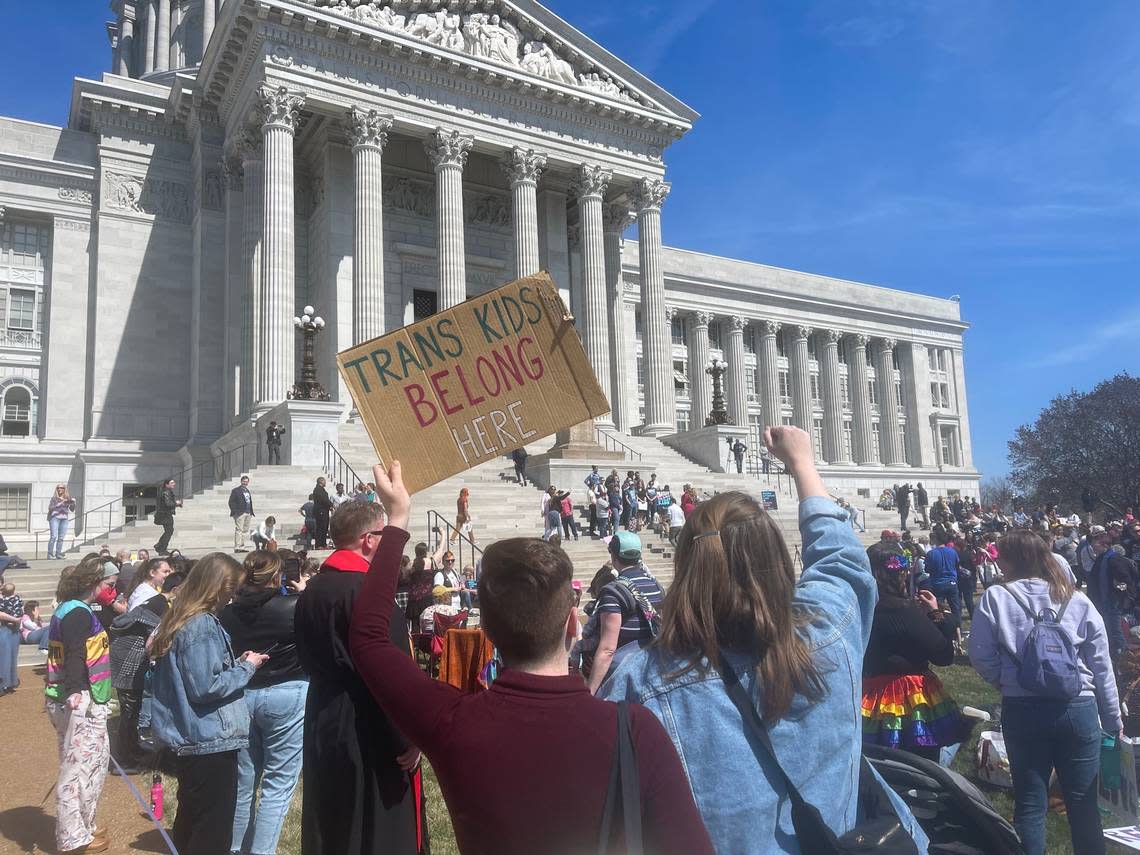What Trans Day of Visibility means to 8 Kansas Citians as KS, MO bills attack rights
LGBTQ+ Kansas Citians and their allies are celebrating the 14th annual Transgender Day of Visibility on Friday in the face of a flurry of legislation targeting transgender and gender non-conforming people in both the Missouri and Kansas legislatures.
The day comes on the heels of a protest in Jefferson City earlier this week where advocates gathered in support of transgender rights and against a slate of bills that would prevent transgender youth from accessing gender-affirming health care, restrict transgender women from participating in sports and limit how gender and sexuality is discussed in classrooms.

Rachel Crandall-Crocker, a transgender therapist, created Transgender Day of Visibility 14 years ago to bring awareness to both the vital contributions and ongoing struggles of the transgender community around the world.
In her own words, “I wanted a day that we can celebrate the living, and I wanted a day that all over the world we could be all together.”
The City of Kansas City will host a celebration for Transgender Day of Visibility on Friday at 3 p.m. at the National WWI Museum auditorium.
The Star reached out to members of the trans community from around Kansas City to see what the day means to them this year, in light of some of the pending legislation.
Several individuals chose not to speak out publicly, citing increasing fear for their safety in recent months.
Here’s what those who did want to share had to say, in their own words.
What does Trans Day of Visibility mean to Kansas Citians?
Natalie Cable (she/her) is a local business owner and resident of Kansas City who grew up on a small farm in southwestern Missouri.
“At 17, I couldn’t picture a place for myself in this world,” she told The Star. “Every moment in public felt like arriving at a Halloween party and discovering I was the only person in costume.
“I knew hiding in the closet would ensure my life was short, but I felt powerless. Then on a gray winter day in 2014, I was riding along in my older brother’s car. He had the radio to a local station, and the DJs spoke with a trans person.
After the segment, both DJs changed their stance on trans identities. They got nasty calls and emails, but the DJs took a positive stance because of one trans person’s choice to be visible.
I knew then that I would come out, and suddenly I could picture my life beyond being 17. Visibility means vulnerability but also carries the power to build community.”
Kipp Ellis (they/them) is a nurse, artist and trans community activist.
“Trans day of visibility causes conflict in my heart this year,” they said.
“These days I don’t want to be seen. I just want to exist — to go to the store, to go to the bathroom — without a constant spotlight on the most private parts of myself.
Being visible right now means being a target. But that’s what they want us to feel. Like we need to shrink ourselves to make them comfortable. So as tired as I am, I will not stand down.”
Joanie Saltzman (ze/hir) is a genderqueer Kansas City resident currently working as a receptionist.
“TDoV is really important to me this year because we have all these lawmakers essentially fighting to make trans people invisible again,” Saltzman wrote in an email to The Star.
“TDoV is a call to celebrate TGNC (trans and gender non-conforming) people NOW, while we’re alive. See us now, passing and non-passing. Hear us now, pre-op, post-op and non-op. Support us now, flamboyant and restrained. It’s a call to affirm us now, before we are murdered. Love us now, before we die by suicide. Protect us now, before we succumb to treatable illness because no doctor would see us.”
Emily High (they/them) is the director of the Kansas City Center for Inclusion, an LGBTQ resource center located in midtown.
“Visibility is personal,” High told The Star. “For a lot of trans people, it’s not safe to be visible. People risk losing jobs, families, church communities, means of support and friendships. If people choose to medically transition, they open themselves up to public scrutiny and harassment.”
“Visibility is also powerful,” they added. “I choose visibility because the community means everything to me. And because I want trans kids to have an example and proof that they have a future. That trans people can be anything, that we are beautiful and natural and worthy.”

Adam Kellogg (he/him) is a student at The University of Kansas who grew up in Johnson County. He has testified before the Kansas legislature about bills related to gender-affirming health care and trans students competing in school sports.
“Trans Day of Visibility started political, (and) it will continue to be political,” Kellogg said. “A big thing for me this year is showing just how present and diverse the trans community is, and how much we have left to do together. In the face of terror and fear, it is joy.”
“I’ve been so visible because I owe it to those people who can’t be, or choose not to be for whatever reason, because they deserve to have their voice in the public space,” he added. “For those people who can’t be out, Trans Day of Visibility is showing them that there is hope.”
Sam (they/them) is a nonbinary single parent and fiber artist who asked to be identified by their first name to protect their private medical information.
“I am intersex and have always struggled with my gender identity,” they told The Star. “Finding the language to explain my gender has helped me to embrace the masculine traits that I’ve always tried so hard to hide.
“Visibility can be dangerous for trans folks but it can also help others to know there are more of us here to stand up and support those of us who are more vulnerable. We have always been here and we are not going anywhere.”
Aphra Maria Karaya (she/her) is an indigenous Taíno artist and mortuary student from Kansas City, Kansas, who describes herself as transsexual and a warishe, the Taíno word for woman. She recently testified before the Kansas state legislature on a bill that would bar transgender people from single-sex spaces.
“I think this day is a celebration for everyone, not just trans people,” she said. “It’s a day for expression of the self.
“It has got to be loud, and it has got to be expressive because so many of us every day are forced into that closet, into those prisons. Trans visibility, to me, is a day that represents the breaking of chains.”
Olive Ursula Cooke (she/her) is an artist, cook, cofounder of Cauldron Collective and Late Nite Bite and an organizer for People’s Pride.
“Trans visibility is important because we all deserve to see people who are like us,” she told The Star.
“We deserve to see that we are not alone and that we can be happy being our true selves. I never could have found the path to being my best self if I hadn’t witnessed all the brave trans people who came before me.”
What are the anti-trans bills making their way through KS, MO legislatures?
Missouri lawmakers have filed at least 35 anti-LGBTQ bills this year, according to a database from the American Civil Liberties Union that tracks legislation nationwide. The Show-Me state is behind only Texas, which had 51 bills filed as of this week.
The GOP-controlled Missouri Senate this month passed a pair of bills that would ban most gender-affirming healthcare for minors and bar transgender people from competing in women’s sports.
Other Missouri legislation seeks to block or control discussions of LGBTQ issues and sexuality in the classroom.
Kansas lawmakers in the GOP supermajority have also pursued a range of bills targeting transgender youth and adults this year.
Next week, the Kansas House and Senate are expected to attempt to override Democratic Gov. Laura Kelly’s veto of a bill banning transgender athletes from girls and women’s sports.
Lawmakers are also pursuing measures banning hormone therapy and gender affirming surgery for minors, blocking transgender and non-binary Kansans from accessing gendered spaces that don’t align with their sex at birth and requiring schools to separate students on overnight field trips by sex assigned at birth.
Where can trans people turn for support in Kansas City?
You can find our reader-suggested list of LGBTQ-friendly houses of worship here and our guide to local resources for LGBTQ+ youth here.
Transformations is a leadership development group focused on serving young trans women of color in Kansas and Missouri. The organization offers mentorship, a professional development camp and plans to offer microgrants. You can reach out through the form at the bottom of this page.
The Northland Pride Network provides the LGBTQ community in the Northland with local resources including lists of affirming healthcare providers and other professionals. You can contact the group by emailing NPN@northlandpridenetwork.org.
The Kansas City Trans Coalition is a newly formed community advocacy group. Learn about its upcoming programming through its Instagram page.
Pride Haven is an overnight shelter for LGBTQ+ people ages 18-24 experiencing homelessness or facing an unsafe situation at home. The shelter provides housing and job search assistance, medical and mental health referrals and other services. You can contact the shelter 24/7 by calling 816-931-0602.
While not Kansas City based, Trans Lifeline is the nation’s only crisis support hotline created by and for trans people. You can contact the hotline at 877-565-8860.
The Star’s Katie Bernard and Kacen Bayless contributed reporting to this piece.
Do you have more questions about the LGBTQ experience in Kansas City? Ask the Service Journalism team at kcq@kcstar.com.
